高考真题英语卷有听力和答案
2023高考英语青海卷听力理解历年真题及答案
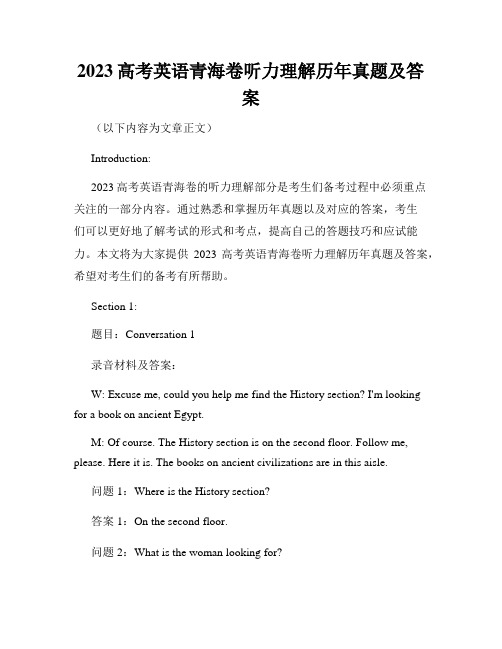
2023高考英语青海卷听力理解历年真题及答案(以下内容为文章正文)Introduction:2023高考英语青海卷的听力理解部分是考生们备考过程中必须重点关注的一部分内容。
通过熟悉和掌握历年真题以及对应的答案,考生们可以更好地了解考试的形式和考点,提高自己的答题技巧和应试能力。
本文将为大家提供2023高考英语青海卷听力理解历年真题及答案,希望对考生们的备考有所帮助。
Section 1:题目:Conversation 1录音材料及答案:W: Excuse me, could you help me find the History section? I'm looking for a book on ancient Egypt.M: Of course. The History section is on the second floor. Follow me, please. Here it is. The books on ancient civilizations are in this aisle.问题1:Where is the History section?答案1:On the second floor.问题2:What is the woman looking for?答案2:A book on ancient Egypt.Section 2:题目:Conversation 2录音材料及答案:M: Good morning, Professor Johnson. I really enjoyed your lecture on climate change yesterday. Could you recommend some books on the topic?W: I'm glad you found the lecture helpful. Yes, there are several books that I can recommend. "Climate Change: A Global Perspective" is a comprehensive overview of the issue, and "The Effects of Climate Change on Biodiversity" focuses specifically on its impact on ecosystems.问题1:What did the man enjoy?答案1:The lecture on climate change.问题2:What book focuses on the impact of climate change on ecosystems?答案2:"The Effects of Climate Change on Biodiversity".Section 3:题目:Passage 1录音材料及答案:M: Good afternoon, this is your captain speaking. I'd like to welcome you aboard Flight 123 to London. The flight duration is approximately 10hours, and we will be cruising at an altitude of 40,000 feet. The weather in London is partly cloudy with a temperature of 20 degrees Celsius.问题1:What is the flight duration to London?答案1:Approximately 10 hours.问题2:What is the weather like in London?答案2:Partly cloudy with a temperature of 20 degrees Celsius.Section 4:题目:Passage 2录音材料及答案:M: Welcome to the National History Museum. The museum is divided into several exhibitions. The Ancient Civilization exhibition is on the ground floor, while the Natural History exhibition is on the second floor. Please note that flash photography is not allowed inside the museum.问题1:Where can visitors find the Ancient Civilization exhibition?答案1:On the ground floor.问题2:What is not allowed inside the museum?答案2:Flash photography.Conclusion:通过了解以上2023高考英语青海卷听力理解历年真题及答案,考生们可以熟悉考试内容和形式,为备考过程中的听力考试打下基础。
2023年高考真题——英语(全国卷Ⅲ)+Word版含答案【KS5U+高考】(2023年word版)

绝密★启用前2023年普通高等学校招生全国统一考试(全国卷III)英语注意事项:1. 答卷前,考生务必将自己地姓名、准考证号填写在答题卡和试卷指定位置上。
2. 回答选择题时,选出每小题解析后,用铅笔把答题卡上对应题目地解析标号涂黑。
如需改动,用橡皮擦干净后,再选涂其他解析标号。
回答非选择题时,将解析写在答题卡上,写在本试卷上无效。
3. 考试结束后,将本试卷和答题卡一并交回。
第一部分听力(共两节,满分30分)做题时,先将解析标在试卷上。
录音内容结束后,你将有两分钟地时间将试卷上地解析转涂到答题卡上。
第一节(共5小题;每小题1.5分,满分7.5分)听下面5段对话。
每段对话后有一个小题,从题中所给地A、B、C三个选项中选出最佳选项。
听完每段对话后,你都有10秒钟地时间来回答有关小题和阅读下一小题。
每段对话仅读一遍。
例:How much is the shirt?A. £19.15.B. £9.18.C. £9.15.解析是C。
1. Where does the conversation probably take place?A. In a supermarket.B. In the post office.C. In the street.2. What did Carl do?A. He designed a medal.B. He fixed a TV set.C. He took a test.3. What does the man do?A. He’s a tailor.B. He’s a waiter.C. He’s a shop assistant.4. When will the flight arrive?A. At 18:20.B. At 18:35.C. At 18:50.5. How can the man improve his article?A. By deleting unnecessary words.B. By adding a couple of points.C. By correcting grammar mistakes.第二节(共15小题;每小题1.5分,满分22.5分)听下面5段对话或独白。
高考英语统考真题:2022--2023年高考英语新全国Ⅰ卷试题(含听力原文 答案;解析)

第一部分:试卷2022年普通高等学校招生全国统一考试(新高考全国Ⅰ卷)英语(使用地区:考听力:福建、河北、湖北、湖南、江苏;不考听力:广东、山东)第一部分听力 (共两节,满分30分)第一节(共5小题;每小题1.5分,满分7.5分)听下面5段对话。
每段对话后有一个小题,从题中所给的A、B、C三个选项中选出最佳选项。
听完每段对话后,你都有10秒钟的时间来回答有关小题和阅读下一小题。
每段对话仅读一遍。
例:How much is the shirt?A. £19.15.B. £9.18.C. £9.15.1. What will the speakers do next?A. Check the map.B. Leave the restaurant.C. Park the car.2. Where are the speakers?A. At a bus stop.B. At home.C. At the airport.3. What did the speakers do last week?A. They had a celebration dinner.B. They went to see a newborn baby.C. They sent a mail to their neighbors.4. Why does the man make the phone call?A. To cancel a weekend trip.B. To make an appointment.C. To get some information.5. What does the man probably want to do?A. Do some exercise.B. Get an extra key.C. Order room service.第二节(共15小题;每小题1.5分,满分22.5分)听下面5段对话或独白。
2024年新课标Ⅱ卷高考英语真题及答案

2024年新课标Ⅱ卷高考英语真题及答案本试卷共12页。
考试结束后, 将本试卷和答题卡一并交回。
注意事项: 1. 答题前, 考生先将自己的姓名、准考证号码填写清楚, 将条形码准确粘贴在考生信息条形码粘贴区。
2. 选择题必须使用 2B 铅笔填涂; 非选择题必须使用 0.5 毫米黑色字迹的签字笔书写, 字体工整、笔迹清楚。
3. 请按照题号顺序在答题卡各题目的答题区域内作答, 超出答题区域书写的答案无效;在草稿纸、试卷上答题无效。
4. 作图可先使用铅笔画出, 确定后必须用黑色字迹的签字笔描黑。
5. 保持卡面清洁, 不要折叠, 不要弄破、弄皱, 不准使用涂改液、修正带、刮纸刀。
第一部分听力(1—20 小题)在笔试结束后进行。
第二部分阅读(共两节, 满分50分)第一节(共15 小题; 每小题 2.5 分, 满分 37.5分)阅读下列短文, 从每题所给的A、B、C、D四个选项中选出最佳选项。
AChoice of Walks for Beginner and Experienced WalkersThe Carlow Autumn Walking Festival is a great opportunity for the beginner, experienced or advanced walker to enjoy the challenges of Carlow’s mountain hikes or the peace of its woodland walks. Walk 1 — The Natural WorldWith environmentalist Éanna Lamhna as the guide, this walk promises to be an informative tour. Walkers are sure to learn lots about the habitats and natural world of the Blackstairs.Date and Time: Saturday, 1st October, at 09:00Start Point: Scratoes BridgeWalk Duration: 6 hours Walk 2 — Introduction to HillwalkingEmmanuel Chappard, an experienced guide, has a passion for making the great outdoors accessible to all. This mountain walk provides an insight into the skills required for hillwalking to ensure you get the most from future walking trips.Date and Time: Sunday, 2nd October, at 09:00Start Point: Deerpark Car ParkWalk Duration: 5 hours Walk 3 — Moonlight Under the StarsWalking at night-time is a great way to step out of your comfort zone. Breathtaking views of the lowlands of Carlow can be enjoyed in the presence of welcoming guides from local walking clubs. A torch (手电筒) along with suitable clothing is essential for walking in the dark. Those who are dressed inappropriately will be refused permission to participate.Date and Time: Saturday, 1st October, at 18:30Start Point: The Town HallWalk Duration: 3 hours Walk 4 — Photographic Walk in Kilbrannish Forest This informative walk led by Richard Smyth introduces you to the basic principles of photography in the wild. Bring along your camera and enjoy the wonderful views along this well-surfaced forest path.Date and Time: Sunday, 2nd October, at 11:45Start Point: Kilbrannish Forest Recreation AreaWalk Duration: 1.5 hours1.Which walk takes the shortest time?A.The Natural World. B.Introduction to Hillwalking. C.Moonlight Under the Stars. D.Photographic Walk in Kilbrannish Forest.2.What are participants in Walk 3 required to do?A.Wear proper clothes. B.Join a walking club.C.Get special permits. D.Bring a survival guide.3.What do the four walks have in common?A.They involve difficult climbing. B.They are for experienced walkers. C.They share the same start point. D.They are scheduled for the weekend.BDo you ever get to the train station and realize you forgot to bring something to read? Yes, we all have our phones, but many of us still like to go old schooland read something printed.Well, there’s a kiosk (小亭) for that. In the San Francisco Bay Area, at least.“You enter the fare gates (检票口) and you’ll see a kiosk that is lit up and it tells you can get a one-minute, a three-minute, or a five-minute story,”says Alicia Trost, the chief communications officer for the San Francisco Bay Area Rapid Transit — known as BART. “You choose which length you want and it gives you a receipt-like short story.”It’s that simple. Riders have printed nearly 20,000 short stories and poems since the program was launched last March. Some are classic short stories, and some are new original works.Trost also wants to introduce local writers to local riders. “We wanted to do something where we do a call to artists in the Bay Area to submit stories for a contest,” Trost says. “And as of right now, we’ve received about 120 submissions. The winning stories would go into our kiosk and then you would be a published artist.”Ridership on transit (交通) systems across the country has been down the past half century, so could short stories save transit?Trost thinks so.“At the end of the day all transit agencies right now are doing everything they can to improve the rider experience. So I absolutely think we will get more riders just because of short stories,” she says.And you’ll never be without something to read.4.Why did BART start the kiosk program?A.To promote the local culture. B.To discourage phone use.C.To meet passengers’ needs. D.To reduce its running costs.5.How are the stories categorized in the kiosk?A.By popularity. B.By length.C.By theme. D.By language.6.What has Trost been doing recently?A.Organizing a story contest. B.Doing a survey of customers. C.Choosing a print publisher. D.Conducting interviews with artists.7.What is Trost’s opinion about BART’s future?A.It will close down. B.Its profits will decline.C.It will expand nationwide. D.Its ridership will increase.CWe all know fresh is best when it comes to food. However, most produce at the store went through weeks of travel and covered hundreds of miles before reaching the table. While farmer’s markets are a solid choice to reduce the journey, Babylon Micro-Farm (BMF) shortens it even more.BMF is an indoor garden system. It can be set up for a family. Additionally, it could serve a larger audience such as a hospital, restaurant or school. The innovative design requires little effort to achieve a reliable weekly supply of fresh greens.Specifically, it’s a farm that relies on new technology. By connecting through the Cloud, BMF is remotely monitored. Also, there is a convenient app that provides growing data in real time. Because the system is automated, it significantly reduces the amount of water needed to grow plants. Rather than watering rows of soil, the system provides just the right amount to each plant. After harvest, users simply replace the plants with a new pre-seeded pod (容器) to get the next growth cycle started.Moreover, having a system in the same building where it’s eaten means zero emissions (排放) from transporting plants from soil to salad. In addition, there’s no need for pesticides and other chemicals that pollute traditional farms and the surrounding environment.BMF employees live out sustainability in their everyday lives. About half of them walk or bike to work. Inside the office, they encourage recycling and waste reduction by limiting garbage cans and avoiding single-use plastic. “We are passionate about reducing waste, carbon and chemicals in our environment,” said a BMF employee.8.What can be learned about BMF from paragraph 1?A.It guarantees the variety of food. B.It requires day-to-day care.C.It cuts the farm-to-table distance. D.It relies on farmer’s markets. 9.What information does the convenient app offer?A.Real-time weather changes. B.Current condition of the plants. C.Chemical pollutants in the soil. D.Availability of pre-seeded pods. 10.What can be concluded about BMF employees?A.They have a great passion for sports.B.They are devoted to community service.C.They are fond of sharing daily experiences.D.They have a strong environmental awareness.11.What does the text mainly talk about?A.BMF’s major strengths. B.BMF’s general management. C.BMF’s global influence. D.BMF’s technical standards.DGiven the astonishing potential of AI to transform our lives, we all need to take action to deal with our AI-powered future, and this is where AI by Design: A Plan for Living with Artificial Intelligence comes in. This absorbing new book by Catriona Campbell is a practical roadmap addressing the challenges posed by the forthcoming AI revolution (变革).In the wrong hands, such a book could prove as complicated to process as the computer code (代码) that powers AI but, thankfully, Campbell has more than two decades’ professional experience translating the heady into the understandable. She writes from the practical angle of a business person rather than as an academic, making for a guide which is highly accessible and informative and which, by the close, will make you feel almost as smart as AI.As we soon come to learn from AI by Design, AI is already super-smart and will become more capable, moving from the current generation of “narrow-AI” to Artificial General Intelligence. From there, Campbell says, will come Artificial Dominant Intelligence. This is why Campbell has set out to raise awareness of AIand its future now-several decades before these developments are expected to take place. She says it is essential that we keep control of artificial intelligence, or risk being sidelined and perhaps even worse.Campbell’s point is to wake up those responsible for AI-the technology companies and world leaders-so they are on the same page as all the experts currently developing it. She explains we are at a “tipping point” in history and must act now to prevent an extinction-level event for humanity. We need to consider how we want our future with Al to pan out. Such structured thinking, followed by global regulation, will enable us to achieve greatness rather than our downfall.AI will affect us all, and if you only read one book on the subject, this is it.12.What does the phrase “In the wrong hands” in paragraph 2 probably mean? A.If read by someone poorly educated. B.If reviewed by someone ill-intentioned. C.If written by someone less competent. D.If translated by someone unacademic.13.What is a feature of AI by Design according to the text?A.It is packed with complex codes. B.It adopts a down-to-earth writing style. C.It provides step-by-step instructions. D.It is intended for AI professionals.14.What does Campbell urge people to do regarding AI development?A.Observe existing regulations on it.B.Reconsider expert opinions about it.C.Make joint efforts to keep it under control.D.Learn from prior experience to slow it down.15.What is the author’s purpose in writing the text?A.To recommend a book on AI. B.To give a brief account of AI history. C.To clarify the definition of AI. D.To honor an outstanding AI expert.第二节(共5小题; 每小题2.5分, 满分12.5分)阅读下面短文, 从短文后的选项中选出可以填入空白处的最佳选项。
2024年1月浙江高考英语听力考试试题真题详解(含答案+录音原文)
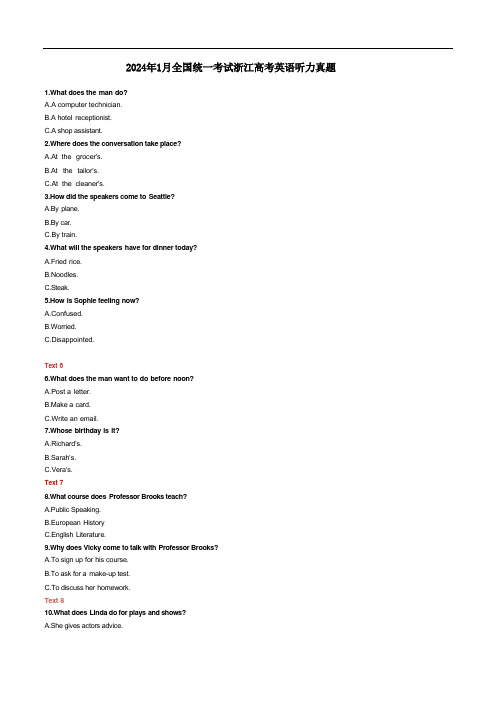
2024年1月全国统一考试浙江高考英语听力真题1.What does the man do?A.A computer technician.B.A hotel receptionist.C.A shop assistant.2.Where does the conversation take place?A.At the grocer's.B.At the tailor's.C.At the cleaner's.3.How did the speakers come to Seattle?A.By plane.B.By car.C.By train.4.What will the speakers have for dinner today?A.Fried rice.B.Noodles.C.Steak.5.How is Sophie feeling now?A.Confused.B.Worried.C.Disappointed.Text66.What does the man want to do before noon?A.Post a letter.B.Make a card.C.Write an email.7.Whose birthday is it?A.Richard's.B.Sarah's.C.Vera's.Text78.What course does Professor Brooks teach?A.Public Speaking.B.European HistoryC.English Literature.9.Why does Vicky come to talk with Professor Brooks?A.To sign up for his course.B.To ask for a make-up test.C.To discuss her homework.Text 810.What does Linda do for plays and shows?A.She gives actors advice.B.She assigns roles to actors.C.She designs actors' clothes.11.What does Linda need to research?A.The setting of the story.B.The decoration of the stage.C.The names of the characters.12.Who does Linda report her work to?A.The director.B.The editor.C.The photographer.13.What does Linda say about her job?A.It pays very well.B.It requires team effort.C.It involves frequent travel.Text 914.What does Kevin think of abstract art?A.It has lasting artistic value.B.It makes little sense to him.C.It appeals mainly to children.15.What impression did the first painting give the woman?A.Hopefulness.B.Nervousness.C.Coldness.16.What color was used for the background in the second painting?A.Green.B.Purple.C.Red.17.What will Kevin probably do this Saturday?A.Attend an art class.B.Visit an exhibition.C.Buy an abstract painting.Text 1018.What caused the closure of Pittwater Road?A.A fallen tree.B.A flooded river.C.A car accident.19.What happened at Town Hall Station?A.A police officer got hurt.B.A passenger went missing.C.The station roof was broken.20.What are road users advised to do?A.Drive at low speed.B.Postpone their trips.C.Follow traffic signs.答案详解Text1请求维修电脑M:IT Department.How can I assist you?W:My computer is giving me a lot of trouble.Could you help me with it,please?M:OK,I just need to check on a couple of things.1.What does the man do?A.A computer technician.B.A hotel receptionist.C.A shop assistant.【解析】A。
2023年高考英语(全国甲卷)试题(含参考答案及听力原文)
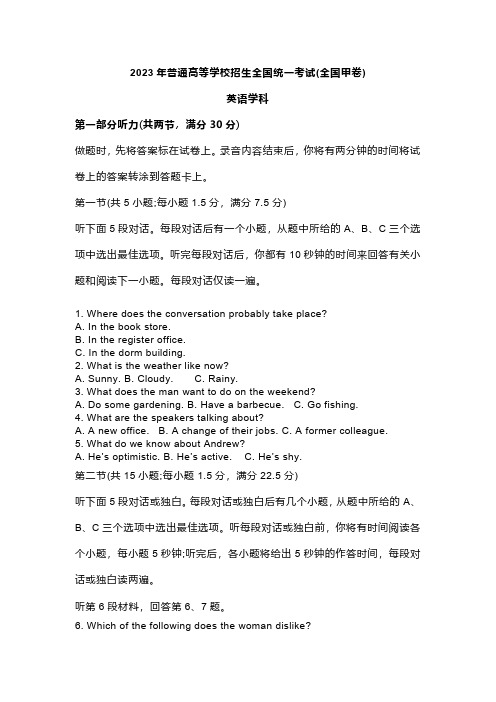
2023年普通高等学校招生全国统一考试(全国甲卷)英语学科第一部分听力(共两节,满分30分)做题时,先将答案标在试卷上。
录音内容结束后,你将有两分钟的时间将试卷上的答案转涂到答题卡上。
第一节(共5小题;每小题1.5分,满分7.5分)听下面5段对话。
每段对话后有一个小题,从题中所给的A、B、C三个选项中选出最佳选项。
听完每段对话后,你都有10秒钟的时间来回答有关小题和阅读下一小题。
每段对话仅读一遍。
1. Where does the conversation probably take place?A. In the book store.B. In the register office.C. In the dorm building.2. What is the weather like now?A. Sunny.B. Cloudy.C. Rainy.3. What does the man want to do on the weekend?A. Do some gardening.B. Have a barbecue.C. Go fishing.4. What are the speakers talking about?A. A new office.B. A change of their jobs.C. A former colleague.5. What do we know about Andrew?A. He’s optimistic.B. He’s active.C. He’s shy.第二节(共15小题;每小题1.5分,满分22.5分)听下面5段对话或独白。
每段对话或独白后有几个小题,从题中所给的A、B、C三个选项中选出最佳选项。
听每段对话或独白前,你将有时间阅读各个小题,每小题5秒钟;听完后,各小题将给出5秒钟的作答时间,每段对话或独白读两遍。
听第6段材料,回答第6、7题。
2023年高考英语真题全国2卷 真题及参考答案

2023年普通高等学校招生全国统一考试新高考英语II卷本试卷共12页。
考试结束后,将本试卷和答题卡一并交回。
注意事项:1.答题前,考生先将自己的姓名、准考证号码填写清楚,将条形码准确粘贴在考生信息条形码粘贴区。
2.选择题必须使用2B铅笔填涂;非选择题必须使用0.5毫米黑色字迹的签字笔书写,字体工整、笔迹清楚。
3.请按照题号顺序在答题卡気题目的答题区域内作答,超出答题区域书写的答案无效;在草稿纸、试卷上答题无效。
4.作图可先使用铅笔画出,确定后必须用黑色字迹的签字笔描黑。
5.保持卡面清洁,不要折叠,不要弄破、弄皱,不准使用涂改液、修正带、刮纸刀。
第一部分听力(共两节,满分30分)做题时,先将答案标在试卷上。
录音内容结束后,你将有两分钟的时间将试卷上的答案转涂到答题卡上。
第一节(共5小题;每小题1.5分,满分7.5分)听下面5段对话。
每段对话后有一个小题,从题中所给的A、B、C三个选项中选出最佳选项,听完每段对话后,你都有10秒钟的时间来回答有关小题和阅读下一小题。
每段对话仅读一遍。
例:How much is the shirt?A. £19.15.B.£9.18.C. £9.15.答案是C。
1.What will Jack probably do this weekend?A. Go camping.B. Visit a friend.C. Watch a film.2.What does the woman ask the man to do?A. Take care of her bags.B. Pack the food for her.C. Check the train schedule.3.When will the man see Bob?A. This Friday.B. This Saturday.C. Next Monday.4.Why does the man apologize?A. For the terrible food.B. For the overcharge.C. For the waiter's rudeness.5.What are the speakers talking about?A. Writing a book.B. Holding a celebration.C. Buying a present.第二节(共15小题;每小题1.5分,满分22.5分)听下面5段对话或独白。
2023高考英语真题【全国新课标I卷】(精校大字版)
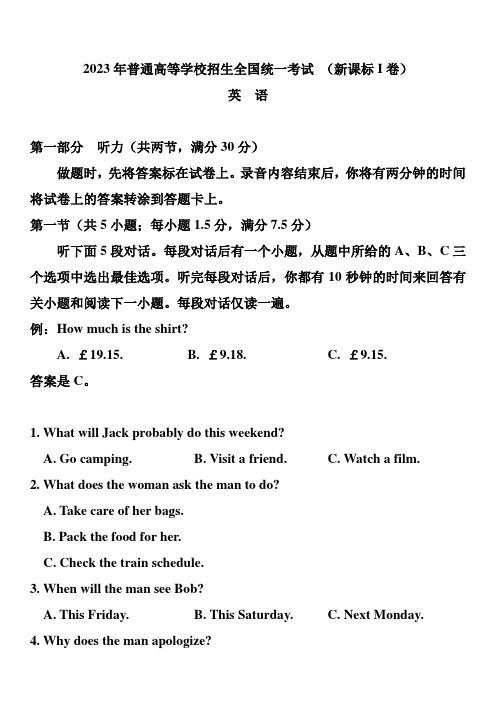
2023年普通高等学校招生全国统一考试(新课标I卷)英语第一部分听力(共两节,满分30分)做题时,先将答案标在试卷上。
录音内容结束后,你将有两分钟的时间将试卷上的答案转涂到答题卡上。
第一节(共5小题;每小题1.5分,满分7.5分)听下面5段对话。
每段对话后有一个小题,从题中所给的A、B、C三个选项中选出最佳选项。
听完每段对话后,你都有10秒钟的时间来回答有关小题和阅读下一小题。
每段对话仅读一遍。
例:How much is the shirt?A. £19.15.B. £9.18.C. £9.15.答案是C。
1. What will Jack probably do this weekend?A. Go camping.B. Visit a friend.C. Watch a film.2. What does the woman ask the man to do?A. Take care of her bags.B. Pack the food for her.C. Check the train schedule.3. When will the man see Bob?A. This Friday.B. This Saturday.C. Next Monday.4. Why does the man apologize?A. For the terrible food.B. For the overcharge.C. For the waiter’s rudeness.5. What are the speakers talking about?A. Writing a book.B. Holding a celebration.C. Buying a present.第二节(共15小题;每小题1.5分,满分22.5分)听下面5段对话或独白。
每段对话或独白后有几个小题,从题中所给的A、B、C三个选项中选出最佳选项。
2024年新课标Ⅱ卷英语卷高考真题文字版
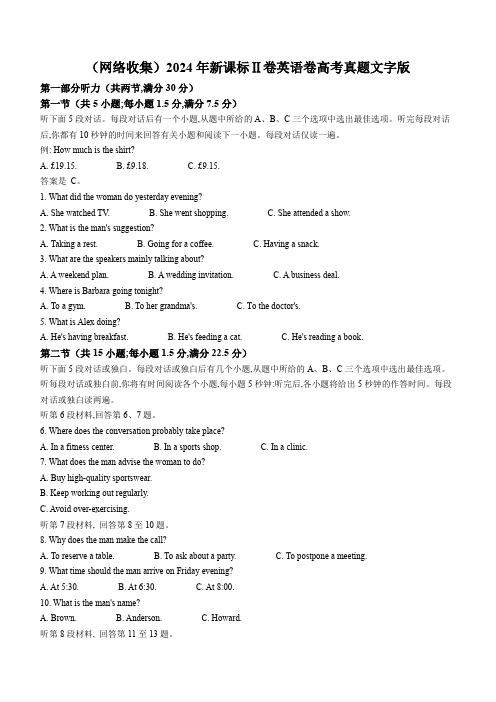
(网络收集)2024年新课标Ⅱ卷英语卷高考真题文字版第一部分听力(共两节,满分30分)第一节(共5小题;每小题1.5分,满分7.5分)听下面5段对话。
每段对话后有一个小题,从题中所给的A、B、C三个选项中选出最佳选项。
听完每段对话后,你都有10秒钟的时间来回答有关小题和阅读下一小题。
每段对话仅读一遍。
例: How much is the shirt?A. £19.15.B. £9.18.C. £9.15.答案是C。
1. What did the woman do yesterday evening?A. She watched TV.B. She went shopping.C. She attended a show.2. What is the man's suggestion?A. Taking a rest.B. Going for a coffee.C. Having a snack.3. What are the speakers mainly talking about?A. A weekend plan.B. A wedding invitation.C. A business deal.4. Where is Barbara going tonight?A. To a gym.B. To her grandma's.C. To the doctor's.5. What is Alex doing?A. He's having breakfast.B. He's feeding a cat.C. He's reading a book.第二节(共15小题;每小题1.5分,满分22.5分)听下面5段对话或独白。
每段对话或独白后有几个小题,从题中所给的A、B、C三个选项中选出最佳选项。
听每段对话或独白前,你将有时间阅读各个小题,每小题5秒钟:听完后,各小题将给出5秒钟的作答时间。
2023年高考全国乙卷英语试题(含听力音频、听力原文和答案)

绝密★考试启用前2023年普通高等学校招生全国统一考试英语乙卷(2023)英语听力音频 双击图标打开收听.mp3适用地区:河南、江西、甘肃、内蒙古、宁夏、新疆、陕西、青海注意事项:1.答卷前,考生务必将自己的姓名、准考证号填写在答题卡上,并将自己的姓名、准考证号、座位号填写在本试卷上。
2.回答选择题时,选出每小题答案后,用2B铅笔把答题卡上对应题目的答案标号涂黑;如需改动,用橡皮擦干净后,再选涂其他答案标号。
涂写在本试卷上无效。
3.作答非选择题时,将答案书写在答题卡上,书写在本试卷上无效。
4.考试结束后,将本试卷和答题卡一并交回。
第一部分听力(共两节,满分30分)做题时,先将答案标在试卷上。
录音内容结束后,你将有两分钟的时间将试卷上的答案转涂到答题卡上。
第一节(共5小题;每小题1.5分,满分7.5分)听下面5段对话。
每段对话后有一个小题,从题中所给的A、B、C三个选项中选出最佳选项。
听完每段对话后,你都有10秒钟的时间来回答有关小题和阅读下一小题。
每段对话仅读一遍。
例:How much is the shirt?A. £19.15.B. £9.18.C. £9.15.答案是C。
1.Where does the conversation probably take place?A. In the book store.B. In the register office.C. In the dorm building. 2.What is the weather like now?A. Sunny.B. Cloudy.C. Rainy.3.What does the man want to do on the weekend?A. Do some gardening.B. Have a barbecue.C. Go fishing.4.What are the speakers talking about?A. A new officeB. A change of their jobsC. A former colleague 5.What do we know about Andrew?A. He’s optimisticB. He’s activeC. He’s shy第二节(共15小题;每小题1.5分,满分22.5分)听下面5段对话或独白。
2023年高考英语新课标III卷听力真题及答案
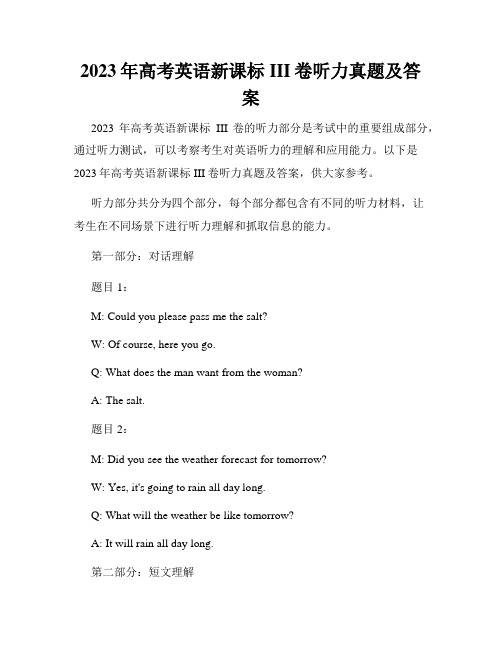
2023年高考英语新课标III卷听力真题及答案2023年高考英语新课标III卷的听力部分是考试中的重要组成部分,通过听力测试,可以考察考生对英语听力的理解和应用能力。
以下是2023年高考英语新课标III卷听力真题及答案,供大家参考。
听力部分共分为四个部分,每个部分都包含有不同的听力材料,让考生在不同场景下进行听力理解和抓取信息的能力。
第一部分:对话理解题目1:M: Could you please pass me the salt?W: Of course, here you go.Q: What does the man want from the woman?A: The salt.题目2:M: Did you see the weather forecast for tomorrow?W: Yes, it's going to rain all day long.Q: What will the weather be like tomorrow?A: It will rain all day long.第二部分:短文理解题目3:W: Good morning, eve ryone. Today, I’d like to talk about my recent trip to Australia. Australia is known for its beautiful scenery and wildlife. During my trip, I visited several cities, such as Sydney, Melbourne, and Brisbane. I was particularly impressed by the Great Barrier Reef, which is one of the Seven Wonders of the Natural World. It was amazing to see the colorful fish and coral. I also had the opportunity to meet some friendly kangaroos and koalas. Overall, it was a wonderful experience and I would highly recommend visiting Australia.Q: What is the speaker talking about?A: Her recent trip to Australia.题目4:M: Excuse me, do you know where the nearest supermarket is?W: Sure. Walk straight for two blocks, then turn left at the traffic lights. You will see the supermarket on your right.Q: What can we learn from the conversation?A: The supermarket is on the right after turning left at the traffic lights.第三部分:知识运用题目5:M: How far is it from the hotel to the airport?W: It's about 20 kilometers. You can take a taxi to get there.Q: How can the man get to the airport?A: By taking a taxi.题目6:W: I'm feeling dizzy after the roller coaster ride. I think I need to sit down for a while.M: Take your time. The feeling will pass soon.Q: What is wrong with the woman?A: She is feeling dizzy.第四部分:听力填空题目7:M: Hi, Lisa. How was your trip to Paris?W: Oh, it was amazing! I visited the Eiffel Tower, the Louvre Museum, and the Notre Dame Cathedral. The food was also incredible, especially the baguettes and croissants.Q: What did Lisa do in Paris?A: She visited the Eiffel Tower, the Louvre Museum, and the Notre Dame Cathedral. The food was also incredible.题目8:M: Have you heard about the art exhibition at the museum?W: Yes, I went there last week. The paintings were absolutely stunning.I was particularly impressed by the artist's use of color and light.Q: What impressed the woman at the art exhibition?A: The artist's use of color and light.以上是2023年高考英语新课标III卷听力真题及答案的内容。
2023年吉林省高考英语真题及参考答案

2023年吉林省高考英语真题及参考答案第一部分听力(共两节,满分30分)做题时,先将答案标在试卷上。
录音内容结束后,你将有两分钟的时间将试卷上的答案转涂到答题卡上。
第一节(共5小题;每小题1.5分,满分1.5分)听下面5段对话。
每段对话后有一个小题,从题中所给的A、B、C三个选项中选出最佳选项。
听完每段对话后,你都有10秒钟的时间来回答有关小题和阅读下一小题。
每段对话仅读一遍。
例:How much is the shirt?A. £19.15.B. £9.18.C. £9.15.答案是C。
1. Where does the conversation probably take place?A. In the book store.B. In the register office.C. In the dorm building.2. What is the weather like now?A. Sunny.B. Cloudy.C. Rainy.3. What does the man want to do on the weekend?A. Do some gardening.B. Have a barbecue.C. Go fishing.4. What are the speakers talking about?A. A new office.B. A change of their jobs.C. A former colleague.5. What do we know about Andrew?A. He’s optimistic.B. He’s active.C. He’s shy.第二节(共15小题;每小题1.5分,满分22.5分)听下面5段对话或独白。
每段对话或独白后有几个小题,从题中所给的A、B、C三个选项中选出最佳选项。
听每段对话或独白前,你将有时间阅读各个小题,每小题5秒钟;听完后,各小题将给出5秒钟的作答时间,每段对话或独白读两遍。
2024年新高考全国Ⅰ卷 英语试卷 (含答案和听力)

2024年普通高等学校招生全国统一考试英语(Ⅰ卷)第一部分听力(共两节,满分30分)做题时,先将答案标在试卷上。
录音内容结束后,你将有两分钟的时间将试卷上的答案转涂到答题卡上。
2024年高考英语听力音频(双击打开).mp3第一节(共5小题;每小题1.5分,满分7.5分)听下面5段对话。
每段对话后有一个小题,从题中所给的A、B、C三个选项中选出最佳选项,并标在试卷的相应位置。
听完每段对话后,你都有10秒钟的时间来回答有关小题和阅读下一小题。
每段对话仅读一遍。
例:How much is the shirt?A. £19.15.B. £ 9.18.C. £ 9.15.答案是C.1.What is Kate doing?A. Boarding a flight.B. Arranging a trip.C. Seeing a friend off.2.What are the speakers talking about?A. A pop star.B. An old song.C. A radio program.3.What will the speakers do today?A. Go to an art show.B. Meet the man's aunt.C. Eat out with Mark.4.What does the man want to do?A. Cancel an order.B. Ask for a receipt.C. Reschedule a delivery.5.When will the next train to Bedford leave?A. At 9:45.B. At 10: 15.C. At 11:00.第二节(共15小题;每小题1.5分,满分22.5分)听下面5段对话或独白。
每段对话或独白后有几个小题,从题中所给的A、B、C三个选项中选出最佳选项,并标在试卷的相应位置。
2023高考新课标1卷英语

2023年新高考I卷英语高考真题(含参考答案)一、听力(30分)(略)二、单项选择(15分)1. A. visit B. join C. attend D. watch【参考答案】C【】attend 意为“参加”,符合句意。
visit 意为“参观”,join 意为“加入”,watch 意为“观看”,均不符合句意。
2. A. looked B. seemed C. appeared D. turned【参考答案】D【】turn 意为“变得”,符合句意。
look 意为“看起来”,seem 意为“似乎”,appear 意为“出现”,均不符合句意。
3. A. because B. since C. as D. for【参考答案】C【】as 意为“因为”,引导原因状语从句,符合句意。
because 和 since 都可以引导原因状语从句,但在此句中,as 更符合语境。
for 为并列连词,不符合句意。
4. A. slowly B. quickly C. suddenly D. gradually【参考答案】D【】gradually 意为“逐渐地”,符合句意。
slowly 意为“慢慢地”,quickly 意为“快速地”,suddenly 意为“突然地”,均不符合句意。
5. A. enough B. too C. so D. very【参考答案】A【】enough 意为“足够”,符合句意。
too 意为“太”,so 意为“如此”,very 意为“非常”,均不符合句意。
三、完形填空(30分)(略)四、阅读理解(40分)A篇【参考答案】1. D 2. B 3. CB篇【参考答案】1. C 2. A 3. BC篇【参考答案】1. A 2. D 3. BD篇【参考答案】1. B 2. C 3. A五、短文改错(10分)【参考答案】Dear Jim,I'm so happy to hear from you. You told mein your last letter that you would come to visit our city this summer vacation. I'm looking forward to seeing you again. It's almost three years since we last met.I think you'll find our city has changed alot over the years. The old theater has been renovated, and a new shopping mall has beenbuilt near the train station. There are also many new restaurants and bars in the city center.I hope you'll have time to visit some of the famous attractions while you're here. The Summer Palace is a beautiful place to visit, and the Forbidden City is also worth seeing. If you have any questions about what to do or where to go, just let me know.Looking forward to seeing you soon.Best wishes,Li Ming【改错】1. so → very2. al most → nearly3. since → ago4. has → have5. near → by6. bars → bar7. Palace → park8. is → was9. what → which10. soon → later六、书面表达(25分)假设你是李华,你的英国朋友Tom计划于下个月来中国,期间他想游览一些城市。
2022年新高考全国I卷英语真题(含听力及参考答案)
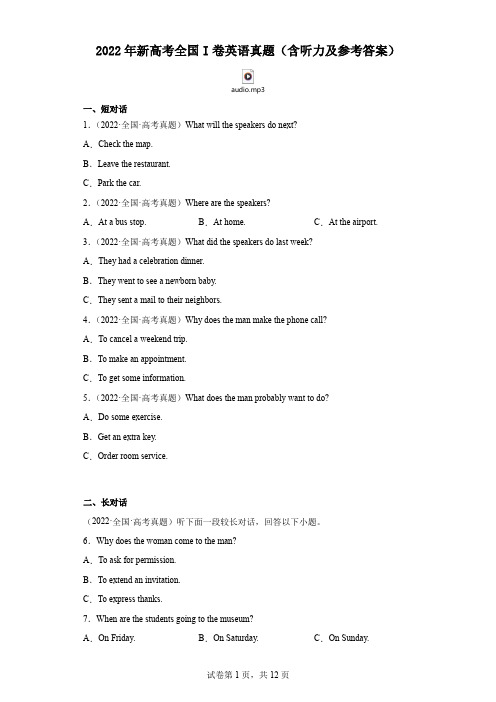
2022年新高考全国I卷英语真题(含听力及参考答案)audio.mp3一、短对话1.(2022·全国·高考真题)What will the speakers do next?A.Check the map.B.Leave the restaurant.C.Park the car.2.(2022·全国·高考真题)Where are the speakers?A.At a bus stop.B.At home.C.At the airport. 3.(2022·全国·高考真题)What did the speakers do last week?A.They had a celebration dinner.B.They went to see a newborn baby.C.They sent a mail to their neighbors.4.(2022·全国·高考真题)Why does the man make the phone call?A.To cancel a weekend trip.B.To make an appointment.C.To get some information.5.(2022·全国·高考真题)What does the man probably want to do?A.Do some exercise.B.Get an extra key.C.Order room service.二、长对话(2022·全国·高考真题)听下面一段较长对话,回答以下小题。
6.Why does the woman come to the man?A.To ask for permission.B.To extend an invitation.C.To express thanks.7.When are the students going to the museum?A.On Friday.B.On Saturday.C.On Sunday.(2022·全国·高考真题)听下面一段较长对话,回答以下小题。
2023年高考真题——英语(浙江卷)+Word版含答案【KS5U+高考】
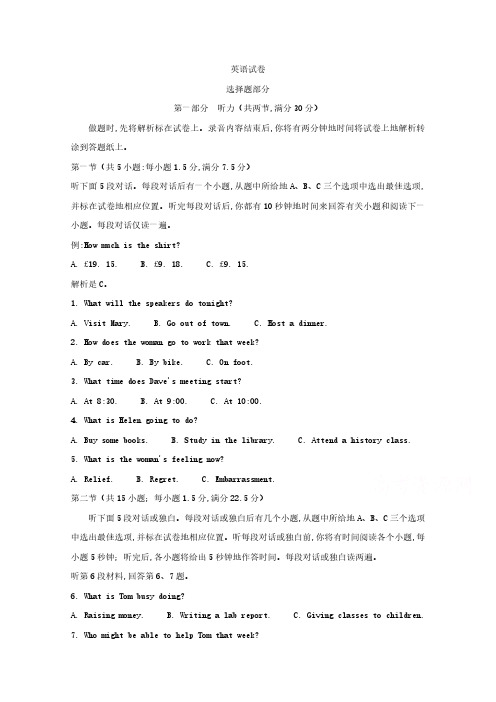
英语试卷选择题部分第一部分听力(共两节,满分30分)做题时,先将解析标在试卷上。
录音内容结束后,你将有两分钟地时间将试卷上地解析转涂到答题纸上。
第一节(共5小题:每小题1.5分,满分7.5分)听下面5段对话。
每段对话后有一个小题,从题中所给地A、B、C三个选项中选出最佳选项,并标在试卷地相应位置。
听完每段对话后,你都有10秒钟地时间来回答有关小题和阅读下一小题。
每段对话仅读一遍。
例:How much is the shirt?A. £19. 15.B. £9. 18.C. £9. 15.解析是C。
1. What will the speakers do tonight?A. Visit Mary.B. Go out of town.C. Host a dinner.2. How does the woman go to work that week?A. By car.B. By bike.C. On foot.3. What time does Dave's meeting start?A. At 8:30.B. At 9:00.C. At 10:00.4. What is Helen going to do?A. Buy some books.B. Study in the library.C. Attend a history class.5. What is the woman's feeling now?A. Relief.B. Regret.C. Embarrassment.第二节(共15小题;每小题1.5分,满分22.5分)听下面5段对话或独白。
每段对话或独白后有几个小题,从题中所给地A、B、C三个选项中选出最佳选项,并标在试卷地相应位置。
听每段对话或独白前,你将有时间阅读各个小题,每小题5秒钟;听完后,各小题将给出5秒钟地作答时间。
每段对话或独白读两遍。
2023年高考英语新课标I卷听力真题及答案
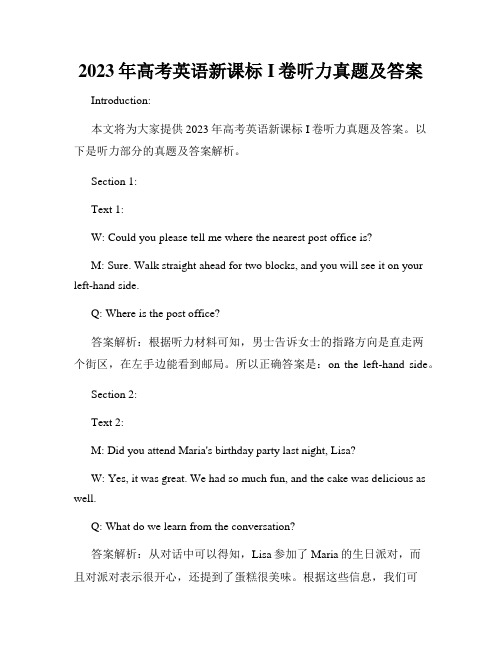
2023年高考英语新课标I卷听力真题及答案Introduction:本文将为大家提供2023年高考英语新课标I卷听力真题及答案。
以下是听力部分的真题及答案解析。
Section 1:Text 1:W: Could you please tell me where the nearest post office is?M: Sure. Walk straight ahead for two blocks, and you will see it on your left-hand side.Q: Where is the post office?答案解析:根据听力材料可知,男士告诉女士的指路方向是直走两个街区,在左手边能看到邮局。
所以正确答案是:on the left-hand side。
Section 2:Text 2:M: Did you attend Maria's birthday party last night, Lisa?W: Yes, it was great. We had so much fun, and the cake was delicious as well.Q: What do we learn from the conversation?答案解析:从对话中可以得知,Lisa参加了Maria的生日派对,而且对派对表示很开心,还提到了蛋糕很美味。
根据这些信息,我们可以推断出他们度过了愉快的时光,所以正确答案是:They had a great time.Section 3:Text 3:W: Excuse me, can you tell me where the library is?M: Sure. Walk down this street until you reach the traffic lights. Turn left and the library is just opposite the park.Q: Where is the library?答案解析:由对话内容可知,男士告诉女士沿着这条街走,直到红绿灯处拐左,在公园对面可以找到图书馆。
- 1、下载文档前请自行甄别文档内容的完整性,平台不提供额外的编辑、内容补充、找答案等附加服务。
- 2、"仅部分预览"的文档,不可在线预览部分如存在完整性等问题,可反馈申请退款(可完整预览的文档不适用该条件!)。
- 3、如文档侵犯您的权益,请联系客服反馈,我们会尽快为您处理(人工客服工作时间:9:00-18:30)。
2018年普通高等学校招生全国统一考试(全国I卷)英语注意事项:1. 答卷前,考生务必将自己的姓名、准考证号填写在答题卡上。
2. 回答选择题时,选出每小题答案后,用铅笔把答题卡上对应题目的答案标号涂黑。
如需改动,用橡皮擦干净后,再选涂其他答案标号。
回答非选择题时,将答案写在答题卡上,写在本试卷上无效。
3. 考试结束后,将本试卷和答题卡一并交回。
第一部分听力(共两节,满分30分)做题时,先将答案标在试卷上。
录音内容结束后,你将有两分钟的时间将试卷上的答案转涂到答题卡上。
第一节(共5小题;每小题分,满分分)听下面5段对话。
每段对话后有一个小题,从题中所给的A、B、C三个选项中选出最佳选项。
听完每段对话后,你都有10秒钟的时间来回答有关小题和阅读下一小题。
每段对话仅读一遍。
例:How much is the shirt?A. £19. 15.B. £9. 18.C. £9. 15.答案是 C。
1.What will James do tomorrow?A.Watch a TV program.B. Give a talk.C. Write a report.2.What can we say about the woman?A.She’s generous.B. She’s curious.C. She’s helpful.3.When does the train leave?A.At 6:30.B. At 8:30.C. At 10:30.4.How does the woman go to work?A.By car.B. On foot.C. By bike.5.What is the probable relationship between the speakers?A.Classmates.B.Teacher and student.C. Doctor and patient.第二节(共15小题;每小题分,满分分)听下面5段对话或独白。
每段对话或独白后有几个小题,从题中所给的A、B、C 三个选项中选出最佳选项。
听每段对话或独白前,你将有时间阅读各个小题,每小题5秒钟;听完后,各小题将给出5秒钟的作答时间。
每段对话或独白读两遍。
听第6段材料,回答第6、7题。
6. What does the woman regret?A. Giving up her research.B. Dropping out of college.C. Changing her major.7. What is the woman interested in studying now?A. Ecology.B. Education.C. Chemistry.听第7段材料,回答第8、9题。
8. What is the man?A. A hotel manager.B. A tour guide.C. A taxi driver.9. What is the man doing for the woman?A. Looking for some local foods.B. Showing her around the seaside.C. Offering information about a hotel.听第8段材料,回答第10至12题。
10. Where does the conversation probably take place?A. In an office.B. At home.C. At a restaurant.11. What will the speakers do tomorrow evening?A. Go to a concert.B. Visit a friend.C. Work extra hours.12. Who is Alice going to call?A. Mike.B. Joan.C. Catherine.听第9段材料,回答第13至16题。
13. Why does the woman meet the man?A. To look at an apartment.B. To deliver some furniture.C. To have a meal together.14. What does the woman like about the carpet?A. Its color.B. Its design.C. Its quality.15. What does the man say about the kitchen?A. It’s a good size.B. It’s newly painted.C. It’s adequately equipped.16. What will the woman probably do next?A. Go downtown.B. Talk with her friend.C. Make payment.听第10段材料,回答第17至20题。
17. Who is the speaker probably talking to?A. Movie fans.B. News reporters.C. College students.18. When did the speaker take English classes?A. Before he left his hometown.B. After he came to America.C. When he was 15 years old.19. How does the speaker feel about his teacher?A. He’s proud.B. He’s sympathetic.C. He’s grateful.20. What does the speaker mainly talk about?A. How education shaped his life.B. How his language skills improved.C. How he managed his business well.第二部分阅读理解 (共两节,满分40分)第一节 (共15小题;每小题2分,满分30分)阅读下列短文,从每题所给的A、B、C和D四个选项中,选出最佳选项。
AWashington, . Bicycle ToursCherry Blossom Bike Tour in Washington, .Duration: 3 hoursThis small group bike tour is a fantastic way to see the world-famous cherry trees with beautiful flowers of Washington, . Your guide will provide a history lesson about the trees and the famous monuments where they blossom. Reserve your spot before availability – and the cherry blossoms – disappear! Washington Capital Monuments Bicycle TourDuration: 3 hours (4 miles)Join a guided bike tour and view some of the most popular monuments in Washington, . Explore the monuments and memorials on the National Mall as your guide shares unique facts and history at each stop. Guided tour includes bike, helmet, cookies and bottled water.Capital City Bike Tour in Washington, .Duration: 3 hoursMorning or Afternoon, this bike tour is the perfect tour for . newcomers and locals looking to experience Washington, . in a healthy way with minimum effort. Knowledgeable guides will entertain you with the most interesting stories about Presidents, Congress, memorials, and parks. Comfortable bikes and a smooth tour route (路线) make cycling between the sites fun and relaxing. Washington Capital Sites at Night Bicycle TourDuration: 3 hours (7 miles)Join a small group bike tour for an evening of exploration in the heart of Washington, . Get up close to the monuments and memorials as you bike the sites of Capitol Hill and the National Mall. Frequent stops are made for photo taking as your guide offers unique facts and history. Tour includes bike, helmet, and bottled water. All riders are equipped with reflective vests and safety lights.21. Which tour do you need to book in advance?A. Cherry Blossom Bike Tour in Washington, .B. Washington Capital Monuments Bicycle Tour.C. Capital City Bike Tour in Washington, .D. Washington Capital Sites at Night Bicycle Tour.22. What will you do on the Capital City Bike Tour?A. Meet famous people.B. Go to a national park.C. Visit well-known museums.D. Enjoy interesting stories.23. Which of the following does the bicycle tour at night provide?A. City maps.B. Cameras.C. Meals.D. Safety lights.BGood Morning Britain’s Susanna Reid is used to grilling guests on the sofa every morning, but she is cooking up a storm in her latest role —showing families how to prepare delicious and nutritious meals on a tight budget.In Save Money: Good Food, she visits a different home each week and with the help of chef Matt Tebbutt offers top tips on how to reduce food waste, while preparing recipes for under £5 per family a day. And the Good Morning Britain presenter says she’s been able to put a lot of what she’s learnt into practice in her own home, preparing meals for sons, Sam, 14, Finn, 13, and Jack, 11.“We love Mexican churros, so I buy them on my phone from my local Mexican takeaway restaurant,” she explains. “I pay £5 for a portion (一份), bur Matt makes them for 26p a portion, because they are flour, water, sugar and oil. Everybody can buy takeaway food, but sometimes we’re not aware how cheaply we can make this food ourselves.”The eight-part series (系列节目), Save Money: Good Food, follows in the footsteps of ITV’s Save Money: Good Health, which gave viewers advice on how to get value from the vast range of health products on the market.With food our biggest weekly household expense, Susanna and Matt spend time with a differen t family each week. In tonight’s Easter special they come to the aid of a family in need of some delicious inspiration on a budget. The team transforms the family’s long weekend of celebration with less expensive but still tasty recipes.24. What do we know about Susanna Reid?A. She enjoys embarrassing her guests.B. She has started a new programme.C. She dislikes working early in the morning.D. She has had a tight budget for her family.25. How does Matt Tebbutt help Susanna?A. He buys cooking materials for her.B. He prepares food for her kids.C. He assists her in cooking matters.D. He invites guest families for her.26. What does the author intend to do in paragraph 4?A. Summarize the previous paragraphs.B. Provide some advice for the readers.C. Add some background information.D. Introduce a new topic for discussion.27. What can be a suitable title for the text?A. Keeping Fit by Eating SmartB. Balancing Our Daily DietC. Making Yourself a Perfect ChefD. Cooking Well for LessCLanguages have been coming and going for thousands of years, but in recent times there has been less coming and a lot more going. When the world was still populated by hunter-gatherers, small, tightly knit (联系) groups developed their own patterns of speech independent of each other. Some language experts believe that 10,000 years ago, when the world had just five to ten million people, they spoke perhaps 12,000 languages between them.Soon afterwards, many of those people started settling down to become farmers, and their languages too became more settled and fewer in number. In recent centuries, trade, industrialisation, the development of thenation-state and the spread of universal compulsory education, especially globalisation and better communications in the past few decades, all have caused many languages to disappear, and dominant languages such as English, Spanish and Chinese are increasingly taking over.At present, the world has about 6,800 languages. The distribution of these languages is hugely uneven. The general rule is that mild zones have relatively few languages, often spoken by many people, while hot, wet zones have lots, often spoken by small numbers. Europe has only around 200 languages; the Americas about 1,000; Africa 2,400; and Asia and the Pacific perhaps 3,200,of which Papua New Guinea alone accounts for well over 800. The median number (中位数) of speakers is a mere 6,000, which means that half the world’s languages are spoken by fewer people than that.Already well over 400 of the total of 6,800 languages are close to extinction (消亡), with only a few elderly speakers left. Pick, at random, Busuu in Cameroon (eight remaining speakers), Chiapaneco in Mexico (150), Lipan Apache in the United States (two or three) or Wadjigu in Australia (one, witha question-mark): none of these seems to have much chance of survival.28. What can we infer about languages in hunter-gatherer times?A. They developed very fast.B. They were large in number.C. They had similar patterns.D. They were closely connected.29. Which of the following best explains “dominant” underlined in paragraph 2?A. Complex.B. Advanced.C. Powerful.D. Modern.30. How many languages are spoken by less than 6,000 people at present?A. About 6,800.B. About 3,400.C. About 2,400.D. About 1,200.31. What is the main idea of the text?A. New languages will be created.B. People’s lifestyles are reflected in languages.C. Human development results in fewer languages.D. Geography determines language evolution.DWe may think we’re a culture that gets rid of our worn technology at the first sight of something shiny and new, but a new study shows that we keep using our old devices (装置) well after they go out of style. That’s bad news for the environment—and our wallets—as these outdated devices consume much more energy than the newer ones that do the same things.To figure out how much power these devices are using, Callie Babbitt and her colleagues at the Rochester Institute of Technology in New York tracked the environmental costs for each product throughout its life—from when itsminerals are mined to when we stop using the device. This method provided a readout for how home energy use has evolved since the early 1990s. Devices were grouped by generation. Desktop computers, basic mobile phones, and box-set TVs defined 1992. Digital cameras arrived on the scene in 1997. And MP3 players, smart phones, and LCD TVs entered homes in 2002, before tablets and e-readers showed up in 2007.As we accumulated more devices, however, we didn’t throw out our old ones. “The living-room television is replaced and gets planted in the kids’ room, and suddenly one day, you have a TV in every room of the house,” said one researcher. The average number of electronic devices rose from four per household in 1992 to 13 in 2007. We’re not just keeping these old devices—we continue to use them. According to the analysis of Babbitt’s team, old desktop monitors and box TVs with cathode ray tubes are the worst devices with their energy consumption and contribution to greenhouse gas emissions (排放) more than doubling during the 1992 to 2007 window.So what’s the solution (解决方案)? The team’s data only went up to 2007, but the researchers also explored what would happen if consumers replaced old products with new electronics that serve more than one function, such as a tablet for word processing and TV viewing. They found that more on-demand entertainment viewing on tablets instead of TVs and desktop computers could cut energy consumption by 44%.32. What does the author think of new devices?A. They are environment-friendly.B. They are no better than the old.C. They cost more to use at home.D. They go out of style quickly.33. Why did Babbitt’s team conduct the research?A. To reduce the cost of minerals.B. To test the life cycle of a product.C. To update consumers on new technology.D. To find out electricity consumption of the devices.34. Which of the following uses the least energy?A. The box-set TV.B. The tablet.C. The LCD TV.D. The desktop computer.35. What does the text suggest people do about old electronic devices?A. Stop using them.B. Take them apart.C. Upgrade them.D. Recycle them.第二节 (共5小题;每小题2分,满分10分)根据短文内容,从短文后的选项中选出能填入空白处的最佳选项。
